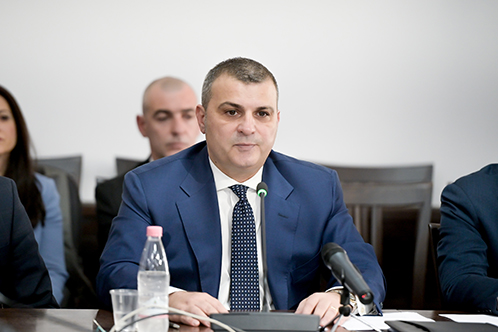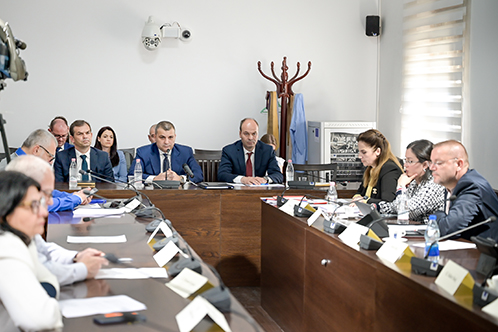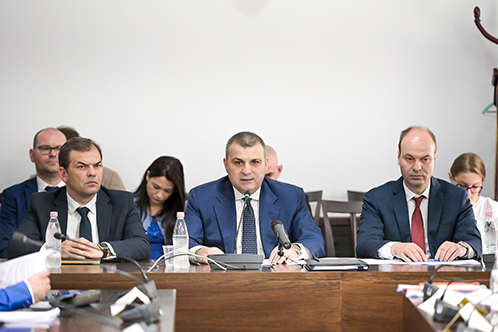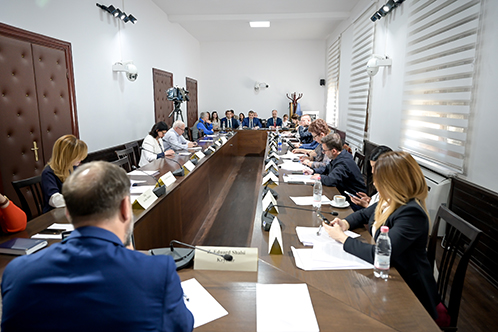BANK OF ALBANIA
PRESS RELEASE
Governor Sejko presents BoA’s Annual Report 2021 to the Parliamentary Committee on Economy and Finance
Publication date: 11.05.2022
Honourable Chair,
Honourable Members of the Committee,
First of all, let me thank you for the trust you have given me in renewing my mandate as Governor of the Bank of Albania. I assure you on the continuing accountability and constructive dialogue between our institutions in the future.
In my speech today, I will present the work and results of the Bank of Albania over the course of 2021, in terms of both complying with our legal duties, and regarding the Parliament Resolution on the activity of the Bank of Albania in 2020, and implementing its institutional commitments.

Nevertheless, availing this opportunity, I would like to share with you our view on the challenges we are tackling in this new economic reality, caused by the Russian military attack on Ukraine. This war has caused a sharp rise in commodity prices in international markets, driving the cost of living for households more expensive and increasing the production costs of businesses. In addition, the armed conflict has heightened the uncertainties and has created new supply chain bottlenecks, which are also being affected by the recent pandemic-related measures imposed in Asia due to its new waves.
This two-fold shock, - on climbing prices and falling economic activity - will also be transmitted to the Albanian economy. It is expected to bring higher inflation rates and a slower economic growth in Albania compared with our pre-war assessments.

However, the positive economic trend in Albania is expected to remain intact in the medium and long term. Based on the current information, we expect economy to continue to grow during 2022 and following. The expanded and solid growth sources, the consolidated economic and financial balances, and the implementation of a stimulating monetary and fiscal policy mix support this opinion. In the other hand, we forecast inflation remains relatively high in 2022. Further, it is expected to trend downwards in 2023, in line with the expected reduction in global markets pressures, and return to target in the first half of 2024.
These projections are based on three important considerations.
First, they are based on the assumption that the war in Ukraine does not escalate and our trading partners continue to grow.

Second, they factorize the solid foundations on which the Albanian economy is based after the comprehensive recovery in 2021. Summarising, allow me to highlight, that the Albanian economy closed 2021 with improved economic and financial parameters. The volume of economic activity grew, employment expanded and the rise in wages accelerated. Overall, private sector's balance sheets improved, the monetary and financial stability in Albania consolidated, and financial markets functioned smoothly. In particular, banking sector maintained good indicators of liquidity, capitalisation and profitability.
Third, they require continuous revision of economic policy mix. The Bank of Albania judges that these policies should continue to underpin the recovery process, coupled with the preservation of the monetary and financial stability of the country. This stability has been and remains a precondition for the sustainable growth of both economy and welfare of society.
Nowadays, meeting this objective, unlike before, requires addressing the risks to hiking inflation.

In the light of the above, the monetary policy of the Bank of Albania will continue to be guided by complying with its primary objective: to maintain price stability. In this spirit, we decided to raise the key interest rate in March, bringing it back to the pre-pandemic level of 1%.
On the other hand, fiscal policy should continue to financially support the low-income strata of society and the sectors most exposed to the shock. However, this support should be financed by additional revenues provided by the price increase and the revision of non-priority expenditures. In this way, the effectiveness of intervention will not damage public debt indicators.
Dear Ladies and Gentlemen,
The conflict has heightened uncertainties for the future. The impact of the war will depend on how the conflict evolves and the potential tightening of sanctions on Russia. We are aware on the upside risks surrounding inflation and the downside risks to the growth outlook.
The role of monetary and fiscal policies, in this complex economic environment, remains critical. The Bank of Albania will continue to monitor inflation performance, and will not hesitate to react in a timely manner and with the right force, to guarantee the monetary and financial stability of the country. Monetary policy stance is expected to normalise gradually during 2022. This position provides an adequate balance between the accelerating risk of inflation and the decelerating risk of economic growth.
In the following, I will briefly address the main directions of the Bank of Albania's work over 2021 and its results.
***
- Albanian economy and monetary policy in 2021
The Albanian economy recovered rapidly over the course of 2021. According to INSTAT data, the Gross Domestic Product grew by 8.5%, after the contraction of 3.5% in 2020. The rapid economic growth reflected the reduced restrictive measures, increased confidence, improved external environment, as well as the fiscal and monetary stimuli. These factors paved the way to the fast expansion of the demand for goods and services.
The swift rebound of economy has some characteristics, which illustrated the flexibility of our economy and are encouraging premises for a continuing sustainable growth.
Let me focus on some of them:
- Rebound in economy was broadly based. In terms of aggregate demand, it reflected the increased consumption and private investments, the expanded exports of goods and services, and the positive contribution of fiscal stimulus. In sectoral terms, it reflected the expansion across all sectors of economy.
- The recovery has been accompanied by an increase of employment and wages, leading to improved financial balance sheets of households. Increased employment enabled the unemployment rate fell to 11.4% at the end of year, standing close to the pre-crisis levels. In reflection of them, wages experienced a high increasing pace across almost all sectors of economy.
- The economy recovered fully. The entire economy and its individual sectors in particular have exceeded both the pre-pandemic and pre -2019 earthquake levels of output and revenues. This development shows the rapid recovery of the demand and the low structural impact of these shocks on the production structure of the economy.
- The recovery reflected the positive contribution of all economic actors. First, the response by enterprises and households showed they had relatively solid balance sheets, alongside the flexibility and willingness to return to their normal economic behaviour. Second, public authorities responded swiftly, adequately and in an efficient manner, thus easing the financial burden of the shock on the Albanian enterprises and households, by paving the way towards recovery. Third, the banking sector continued to finance the expansion in both consumption and investments, by simultaneously improving its profitability and liquidity indicators.
- Last, but not least, the recovery was accompanied by the improvement of economic and financial equilibriums of Albania. Both external and fiscal positions of Albania improved and the main indicators of financial soundness were consolidated. The decrease in the current account deficit averaged 7.7% of the GDP in 2021, against the 8.7% registered in the previous year. In fiscal area, the combination of economic growth with the decreased budget deficit contributed to the fall in public debt to GDP ratio at 73.2%, from 74.5% recorded in 2020.
The progressive growth in the demand for goods and services enabled the increase in employment, wages and profit margins. In 2021, annual inflation averaged 2.0%, from 1.6 % in the previous year. On the other hand, the sharp rise in international markets’ prices pushed up inflation to 3.7% in December, and 5.7% in March 2022.
Dear Ladies and Gentlemen,
Availing your time, let me address the role that the Bank of Albania has played in the recovery process, with regard to both economic growth and safeguarding financial stability.
The monetary policy continued to maintain the accommodative stance throughout 2021 as well. The policy rate remained at its historic lowest levels, of 0.5%, while the liquidity volume injected into the system increased. In parallel with them, the Bank of Albania continued to use forward guidance in the monetary policy stance, contributing in the reduction of uncertainties in financial markets.
The accommodative monetary policy stance has provided for an environment with low financing costs and adequate lending conditions. Financial markets operated smoothly and were characterised by ample liquidity and contained risk premia. The effective transmission of monetary stimulus has maintained the interest rates on loans to public and private sectors at low levels. Also, the exchange rate was relatively stable, by reflecting the supply and demand balance for foreign currency.
This environment enabled a stable credit growth. The volume of credit to private sector rose averagely 8.4% over 2021 - the highest growth rate since 2012. Beyond the overall growth of credit portfolio, lending dynamics embodied other positive signals. First, the increase of credit portfolio has broadly supported the financing of enterprises’ investments and for mortgage loans, by signalling the upsurge in investments of the private sector and an improving situation of its liquidity. Second, loans in the domestic currency continued to maintain higher increasing rates, by being reflected in the progressive growth of the share of loans in lek to total credit. This encouraging development establishes the premises for a better transmission of the monetary stimulus and a higher resilience of the banking system against risks. Third, the quality of credit portfolio to private sector has been improving, as illustrated by the progressive fall in the non-performing loans ratio.
Our assessments show that the accommodative monetary policy stance has contributed by around 1.3 percentage points to the economic growth in 2021. The low interest rates, the low risk premia, uninterrupted lending to economy and increased competition of the Albanian exports drove to this positive contribution. The monetary stimulus has provided a positive contribution in price stability through bolstering the aggregate demand and better utilisation of production capacities.
Allow me to address some issues related to financial stability and banking supervision and regulation.
- Banking supervision and financial stability
The banking system performed positively throughout 2021. During the pandemic period, the banking system showed a serious partner in supporting the economic development of Albania, by undertaking a considerable part of cots. Year 2021 affirmed this sector has high resilience levels, owing to the macroprudential policies of the Bank of Albania, the sound supervision framework and the continuous improvement of controlling systems of banks.
The financial activity of the banking system was stable, their investments have expanded, the quality of asset portfolio has been improved and the profit rates have been increasing. The financial result was positive and around 29% higher from the previous year; capital adequacy ratio remained at 18%, considerably above the regulatory limit while non-performing loans ratio declined to 5.6%, as at end of year, from 8.1% in the previous year, by recording the lowest rate in the last decade. The exposure of the activity of the banking sector to risks remains contained. Stress test exercises show that the capability of the banking sector to withstand losses deriving from the materialisation of unfavourable shocks on the real and financial sector remains strong.
These positive results have not decreased our attention on strengthening bank supervision and improving the macroprudential framework. Some of the priorities in the work of the Bank of Albania in this regard are listed following.
Opening the equivalence process of our supervisory and regulatory framework with the European Union framework. This process aims at certifying the convergence degree of our regulatory framework and supervisory practices with those of the European Union. An independent assessment of the supervisory framework in Albania was performed in 20121, with the technical assistance of international experts. This assessment concluded that Albania has a high equivalence level with the European Union standards. The Bank of Albania has already submitted the request to the European Commission to begin the formal equivalence process.
Implementing the recommendations from the Committee of Experts of CoE on the Evaluation of Anti-Money Laundering Measures and counter Terrorist Financing (MONEYVAL). The Bank of Albania is included in the implementation of the national plan of measures on the prevention of money laundering and combating the financing of terrorism, with a view to improving the regulatory framework and strengthening the effectiveness of supervisory process. In this framework, the Bank of Albania has continued the on-site examinations related to the prevention of money laundering, with a particular focus on terrorist financing issues and the implementation of international sanctions. Examinations were targeted to banks, non-bank financial institutions (NBFISs) and foreign exchange bureaus (FEBs).
Improving the regulatory framework on transparency enhancement and consumer protection. In the view of accelerated lending to consumers, particularly from non-bank financial institutions, the Bank of Albania undertook an initiative seeking to foster the regulatory framework on consumer loans, aimed at protecting consumers from high and unjustified interest rates applied on these loans. The amendments introduce for the first time the concept of the cap on EIR and penalties applied on clients of consumer loans. The best practices from the European Union members were followed for the realisation of these amendments.
In addition, amendments took place in the framework of transparency on banking products, where with the gradual replacement process of reference on banking products interest rates, like LIBOR, EURIBOR, etc., banks should increase the information degree to borrowers. The adopted amendments in the respective regulations regulate this information in terms of the legal basis on the contractual relationships.
Regulatory and methodological approximation with the international standards. The Bank of Albania has continued to work for the improvement of the regulatory framework, aiming at its alignment with the EU Acquis, the Basel Committee principles and the best practices of banking supervision. The revision of regulations has been focused on approximation with the latest European Union (EU) Acquis (directives and regulations), aimed at assessing the ability on liquidity management of banks; creation of capital buffers to protect banks from various risks-related exposures. Also, an important part of sub-legal acts have been drafted and approved to complete the regulatory framework for the implementation of the Law “On Payment services” and the Law “On the recovery and resolution of banks in the Republic of Albania”.
The rigorous monitoring of financial system through on-site inspections. On-site inspections have continued regularly, through increasing the examinations in non-bank financial institutions and foreign exchange bureaus. Examinations in banks have been focused on the assessment of the pandemic situation management and the impact on credit portfolio. Banks have implemented a prudential approach towards lending, based on defined criteria for providing facilities to clients with problems. In addition to credit risk focus, the examinations have assessed the other risks’ profile related to the banking activity, such as: operational and information technology risk; financial risks, etc. In this context, relevant recommendations have been provided accordingly.
Strengthening the resolution capacity in banks. The compilation of resolution plans for all banks that conduct their activity in the Albanian market has been completed. In addition potential obstacles to the resolution ability have been identified. In compliance with the legal and regulatory framework on resolution in banks, there are set out the minimum requirements of instruments that banks should hold in any time, aimed at enabling the implementation of resolution.
Development and implementation of macro-prudential policy for the purpose of financial stability. The measures aimed at reducing the use of foreign currencies in the activity of the banking system and the macro-prudential capital buffers have continued to be implemented in 2021. Developments, throughout 2021, have not requested for interventions with macroprudential measures. Nevertheless, the use of foreign currencies remains at high levels, and requires increased attention from other authorities.
***
Alongside with its primary role to safeguarding monetary and financial stability, the Bank of Albania is in charge of a range of duties and activities, which due to the time, I am going to address briefly.
- Other activities
Guaranteeing safe and efficient payment systems. The Bank of Albania operates two payment systems in lek: the Albanian Electronic Clearing House (AECH) for small value payments; and the Albanian Interbank Payment (AIPS) for large-value payments. Both systems have showed maximum availability and have operated safely, by guaranteeing the flow of funds to the economy. The Bank of Albania, aiming at completing and modernising the payment infrastructure in Albania, has finalised the project on operating a new settlement system of national payments in Euro to banks’ clients - AIPS-Euro. This system has started to operate in January 2022. The AIPS Euro enables the Albanian citizens to conduct euro-dominated payments within Albania with a quite lower cost and at a shorter time from the current process carried out by the corresponding banks. Also, with a view to increasing financial inclusion and the use of electronic payments, in 2021, it was enabled the implementation of “Direct debiting” scheme, which provides consumers with flexibility in conducting payments for utility services through the banking system.
Boosting electronic payments and financial inclusion of population. The number of electronic payments conducted in Albania was up by 29.5% in 2021. The regulatory amendments through the Law “On payment services”, coupled with the infrastructural improvement helped their increase. The use of electronic payments per capita reached at 12.5, at the end of 2021, from 4.3 in 2017. Also, the expansion in the share of population owing a current account has recorded positive developments. In 2021, around 69% of adults have a payment account, from only 40% in 2017.
Improving the regulatory framework of payment system in compliance with the European Union standards. In 2021, the Law “On payment account to access basic services” is drafted in line with the EU Directives. Its approval enables the basic financial services to individuals with no access in bank services, notwithstanding the level of income, employments status, and the history of solvency.
Currency issue. The physical security and the well-management of cash, is another crucial pillar in our activity. In this regard, in June 2021, we signed the agreement with the ECB on the protection of euro banknote from counterfeiting, making thus the Bank of Albania an integral part of the European process in the fight against banknotes counterfeiting.
Also, we have finalised the completion of the new series of banknotes, consisting in six denominations. In December 2021, the two last denominations of this series, namely 500 Lekë and 2,000 Lekë were put in circulation. Meanwhile, in June 2021, the bank note with the highest denomination, 10,000 Lekë was put into circulation. In addition, this banknote introduces a novelty in the production process of our currency.
Banknotes of the new series are produced with state-of-the art technology and embody contemporary and sophisticated security features.
Accomplishing institutional obligations under the European integration process. The Bank of Albania plays a crucial role in meeting the national commitments for joining the European Union. In this view, the Bank of Albania coordinates one chapter on legislation compatibility, while is a member of the work groups for the other chapters. The Bank of Albania has fulfilled the approval of sub-legal acts deriving from the National Plan for European Integration and has included in its work priorities the recommendations of the European Commission.
Enhancing communication, transparency and accountability. The Bank of Albania remains an open institution, ready to communicate in a transparent manner its decisions, and seriously respond on its activity. In 2021, we continued to communicate in person and virtually with media, academics, and public at large and all interested parties. In recent years, the Bank of Albania is publicly engaged in campaigns on financial education. In collaboration with the Albanian Association of Banks, various activities were organized throughout the year, aimed at increasing both financial literacy of public and awareness on personal finances.
In parallel with them, the Bank of Albania has progressed further in: the field of foreign exchange reserve management; scientific research; the collection, compilation and reporting process of statistics; and in terms of strengthening the governance of the institution. Also, the Bank of Albania has fulfilled the recommendations left by the Assembly of the Republic of Albania in the Resolution “On the assessment of the activity of the Bank of Albania for 2021”.
The Report provides detailed information on these issues.
***
Honourable Committee members,
Thanking you for your attention, allow me to emphasise that the Bank of Albania has been and remains committed to: complying with its legal objectives; addressing the challenges to growth; and constructing a constructive dialogue with all actors and stakeholders of both economic and social life.
The Parliament of Albania and public will see in the Bank of Albania a reliable partner in the path of the sustainable development of the country.
Thank You!

 Twitter
Twitter
 Youtube
Youtube
 Facebook
Facebook
 Flickr
Flickr
 RSS
RSS
 Subscribe
Subscribe
 Feedback
Feedback